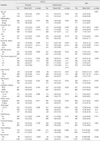Abstract
Purpose
The objective of this study was to investigate the predictors of depression and coping and the correlation between depression and use of coping among breast cancer patients in Korea.
Methods
Of 1,250 eligible breast cancer patients attending Yonsei University Severance Hospital, 1,160 completed our surveys. Depression and coping were assessed using the Beck Depression Inventory and Korean Cancer Coping Questionnaire. Socio-demographic characteristics were included in the survey and medical factors were compiled by reviewing each patient's medical chart.
Results
Education, economic status, the level of daily activities, menopause and the type of surgery significantly predicted depression. Age, education, economic status, time since surgery, the level of daily activities, and menopause were significant predictors for personal coping; marriage, education, economic status, time since surgery, the surgical method and radiotherapy significantly predicted interpersonal coping. Personal coping and interpersonal coping had significant negative correlations with depression.
Conclusion
Many factors are significant predictors but education and economic status are the most significant and consistent predictors for both depression and coping in breast cancer patients. Psychosocial intervention should be planned according to different characteristics of breast cancer patients, in order to reduce depression and enhance effective coping.
Figures and Tables
References
1. Ministry of Health and Welfare, Central Cancer Registry. 2002 Annual report of the Korea Central Cancer Registry: based on registered data from 139 hospitals. 2003. Seoul: Ministry of Health and Welfare, Central Cancer Registry.
2. Cancer statistics. accessed May 8th, 2009. National Cancer Information Center, Korea;http://www.cancer.go.kr/statics/survival_rate/index.html.
3. Korean Breast Cancer Society. Clinical characteristics of Korean breast cancer patients in 1998. J Korean Med Sci. 2000. 15:569–579.
4. Stanton AL, Snider PR. Coping with a breast cancer diagnosis: a prospective study. Health Psychol. 1993. 12:16–23.

5. Zabora JR. Bland KL, Copeland EM, editors. The psychosocial consequences of breast cancer. The breast: comprehensive management of benign and malignant diseases. 1998. 2nd ed. Philadelphia: W.B. Saunders;1539–1552.
6. Bodurka-Bevers D, Basen-Engquist K, Carmack CL, Fitzgerald MA, Wolf JK, de Moor C, et al. Depression, anxiety, and quality of life in patients with epithelial ovarian cancer. Gynecol Oncol. 2000. 78:302–308.

7. Rijken M, de Kruif AT, Komproe IH, Roussel JG. Depressive symptomatology of post-menopausal breast cancer patients: a comparison of women recently treated by mastectomy or by breast-conserving therapy. Eur J Surg Oncol. 1995. 21:498–503.

8. Ell K, Sanchez K, Vourlekis B, Lee PJ, Dwight-Johnson M, Lagomasino I, et al. Depression, correlates of depression, and receipt of depression care among low-income women with breast or gynecologic cancer. J Clin Oncol. 2005. 23:3052–3060.

9. Somerset W, Stout SC, Miller AH, Musselman D. Breast cancer and depression. Oncology (Williston Park). 2004. 18:1021–1034.
10. Weitzner MA, Meyers CA, Stuebing KK, Saleeba AK. Relationship between quality of life and mood in long-term survivors of breast cancer treated with mastectomy. Support Care Cancer. 1997. 5:241–248.

11. Taylor SE, Stanton AL. Coping resources, coping processes, and mental health. Annu Rev Clin Psychol. 2007. 3:377–401.

12. Osowiecki DM, Compas BE. A prospective study of coping, perceived control, and psychological adaptation to breast cancer. Cognit Ther Res. 1999. 23:169–180.
13. Stanton AL, Danoff-Burg S, Cameron CL, Bishop M, Collins CA, Kirk SB, et al. Emotionally expressive coping predicts psychological and physical adjustment to breast cancer. J Consult Clin Psychol. 2000. 68:875–882.

14. Reynolds P, Hurley S, Torres M, Jackson J, Boyd P, Chen VW. Use of coping strategies and breast cancer survival: results from the Black/White Cancer Survival Study. Am J Epidemiol. 2000. 152:940–949.

15. Stanton AL, Danoff-Burg S, Huggins ME. The first year after breast cancer diagnosis: hope and coping strategies as predictors of adjustment. Psychooncology. 2002. 11:93–102.

16. Schnoll RA, Harlow LL, Stolbach LL, Brandt U. A structural model of the relationships among stage of disease, age, coping, and psychological adjustment in women with breast cancer. Psychooncology. 1998. 7:69–77.

17. Hahn HM, Yum TH, Shin YW, Kim KU, Yoon DJ, Chung KJ. A standardization study of Beck Depression Inventory in Korea. J Korean Neuropsychiatr Assoc. 1986. 25:487–501.
18. Lee YH, Song JY. A study of reliability and the validity of the BDI, SDS, and MMPI-D scale. Korean J Clin Psychol. 1991. 10:98–113.
19. Moorey S, Frampton M, Greer S. The Cancer Coping Questionnaire: a self-rating scale for measuring the impact of adjuvant psychological therapy on coping behaviour. Psychooncology. 2003. 12:331–344.

20. Kim JN, Kwon JH, Kim SY, Yu BH, Hur JW. Validation of Korean-Cancer Coping Questionnaire (K-CCQ). Korean J Health Psychol. 2004. 9:395–414.
21. Gujarati DN. Gujarati DN, editor. Multicollinearity: What happens if the regressors are correlated. Basic Econometrics. 2003. 4th ed. New York: McGraw-Hill;341–386.
22. Kim SH, Jun EY, Lee WH. The factors influencing depression in patients with breast cancer. J Korean Oncol Nurs. 2006. 6:133–142.
23. Han TH, Ahn HJ. The severity and variables influencing depression in cancer patients with pain. Korean J Anesthesiol. 2000. 39:554–562.

24. Ennis NE, Hobfoll SE, Schröder KE. Money doesn't talk, it swears: how economic stress and resistance resources impact inner-city women's depressive mood. Am J Community Psychol. 2000. 28:149–173.

25. Hwang SY, Park BW. The perceived care needs of breast cancer patients in Korea. Yonsei Med J. 2006. 47:524–533.

26. Fukui S, Kugaya A, Okamura H, Kamiya M, Koike M, Nakanishi T, et al. A psychosocial group intervention for Japanese women with primary breast carcinoma. Cancer. 2000. 89:1026–1036.

27. Ganz PA, Greendale GA, Petersen L, Kahn B, Bower JE. Breast cancer in younger women: reproductive and late health effects of treatment. J Clin Oncol. 2003. 21:4184–4193.

28. Osborne RH, Elsworth GR, Hopper JL. Age-specific norms and determinants of anxiety and depression in 731 women with breast cancer recruited through a population-based cancer registry. Eur J Cancer. 2003. 39:755–762.





 PDF
PDF ePub
ePub Citation
Citation Print
Print








 XML Download
XML Download